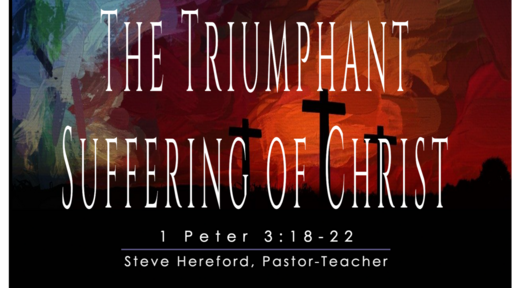The Triumphant Suffering of Christ

Jesus was triumphant over death, sin, demons and Satan. Peter offers this as encouragement to his suffering congregation. Join Pastor Steve in 1 Peter 3:18-22 as he talks about Christ's suffering and triumph and what He died while He was in the tomb.
The once-for-all offering of Christ stands in contrast to the annual sacrifice of the Jewish high priest on the Day of Atonement and portrays the absolute sufficiency of His atoning work
According to Whedon, the preposition peri (“for”) “represents Christ throwing himself down upon and around sins in such a manner that the falling curse of the broken law would surely strike him.”
The oldest interpretation, the traditional Jewish view of ancient rabbis and modern Jewish commentators, as well as of the church fathers, is that “the sons of God” were demons, or fallen angels. The context of judgment in the Flood precludes holy angels from being in view (see Gordon J. Wenham, Genesis 1–15, Word Biblical Commentary [Waco, Tex.: Word, 1987), 1:139).
so that even 120 years of Noah’s preaching, while the ark was being built, could not convince any of the human race beyond the 8 people in Noah’s family to believe in God (see notes on 2 Pet. 2:4, 5; Jude 6, 7; cf. Gen. 6:1–8). Thus God bound these demons permanently in the abyss until their final sentencing.
If He was humiliated for us, He is also exalted for us. If He Himself once stooped to come near to us, He now lifts us up from our low estate and brings us near to Himself in His glory. It is not only that He is partaker of our lowliness, but we are partakers of His exaltation. The fellowship is full and complete, for while He takes upon Himself our fall, we, on the other hand, partake in His rising again. He comes down to us in His incarnation, but He calls us up to Him in His ascension. He wears our garb of poverty by bearing our flesh, but He robes us in His splendor as He bears our nature into heaven.
